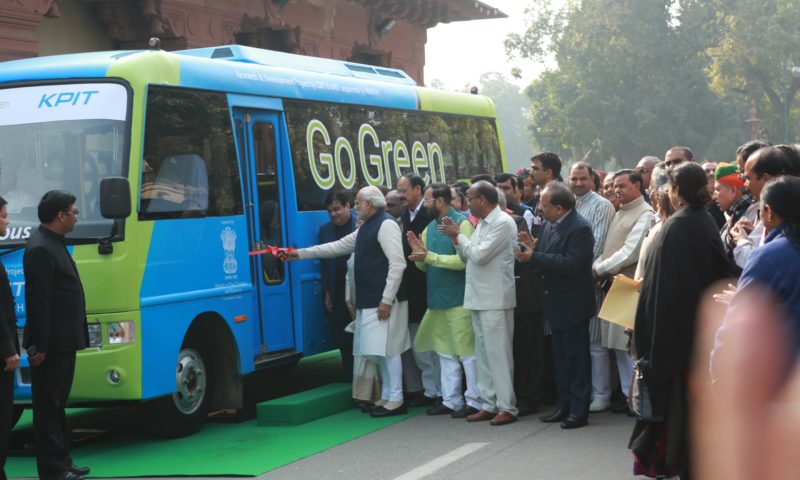The Department of Heavy Industry (under the Ministry of Heavy Industries & Public Enterprises) has selected 11 cities for subsidy disbursal under the first phase of the “Faster Adoption and Manufacturing of Electric and Hybrid Vehicles in India,” popularly known as the FAME scheme.
The total subsidy that is being provided by the ministry is to the tune of Rs.437 crore (including about Rs.40 crore for charging infrastructure) for launching electric buses, taxis (four-wheelers) and three-wheeler autos in these 11 cities.
This list of cities was drawn up following an expression of interest (EOI) that received 47 proposals from 44 cities across 21 states. These 47 proposals envisaged financial support of Rs.4,055 crore from the government of India towards purchase of 3,144 electric buses, 2,430 e-four wheeler taxis and 21,545 e-three wheeler autos.
A total of 44 cities submitted their expressions of interest of which 11 were selected
The 11 cities are Delhi, Ahmedabad, Bangalore, Jaipur, Mumbai, Lucknow, Hyderabad, Indore, Kolkata, Jammu and Guwahati. The last two cities have been nominated under the special category scheme. The total subsidy of Rs.437 crore envisages support towards procurement of 390 buses, 370 taxis and 720 three-wheelers.
 Bengaluru will be the biggest beneficiary with 640 vehicles comprising 500 three-wheelers, 100 four-wheeler taxis and 40 buses. All the nine major cities will get 40 buses while the two special category cities of Jammu and Guwahati will get 15 buses each. (See table)
Bengaluru will be the biggest beneficiary with 640 vehicles comprising 500 three-wheelers, 100 four-wheeler taxis and 40 buses. All the nine major cities will get 40 buses while the two special category cities of Jammu and Guwahati will get 15 buses each. (See table)
Following the successful EOI exercise, the selected cities are required to finalize the tendering process and issue supply orders before February 28, 2018.
In October 2017, the department of heavy industries had invited EOIs from cities with a population of 1 million-plus, as well as special category states, for electric-driven multimodal transport. The last date for receipt of the proposal was November 30, 2017.
These 11 cities will form the pilot project for multimodal electric public transport under the FAME India scheme, which was launched in April 2015. The cities were shortlisted based on parameters like population, vehicle density, vehicular pollution, Swachhata Abhiyan ranking, coverage under Smart City programme, the available financial outlay under Phase 1 of FAME India scheme etc.
Import-dependence is unhealthy
A few months ago, Anant Geete, Union minister for heavy industries and public enterprises, in an event held in Mumbai had expressed confidence that e-mobility was a good opportunity to domestic electric equipment manufacturers. However, Geete had cautioned that the main challenge was with respect to the lithium-ion battery, currently the choice for electric vehicles worldwide.
There is no domestic competency as yet in manufacturing lithium-ion (Li-on) batteries and hence the dependence on imports was inevitable, felt Geete. Even the subsidy envisaged under the aforementioned FAME India scheme was applicable on vehicles, and not on batteries, the minister informed. This 100 per cent dependency on imports for Li-on batteries was an unhealthy sign, cautioned Geete.
Also read: Life beyond the pandemic
Featured photograph, sourced from www.kpit.com shows file image of Prime Minister Narendra Modi flagging off a smart electric bus presented in December 2015 to the Indian Parliament, for its members to experience green and intelligent technology. The bus was developed using indigenous technology by India-headquartered global technology company KPIT, in partnership with Central Institute of Road Transport (CIRT).
This article’s author, Venugopal Pillai, is Editor, T&D India. Views expressed here are personal. The author may be contacted on venugopal.pillai@tndindia.com)

